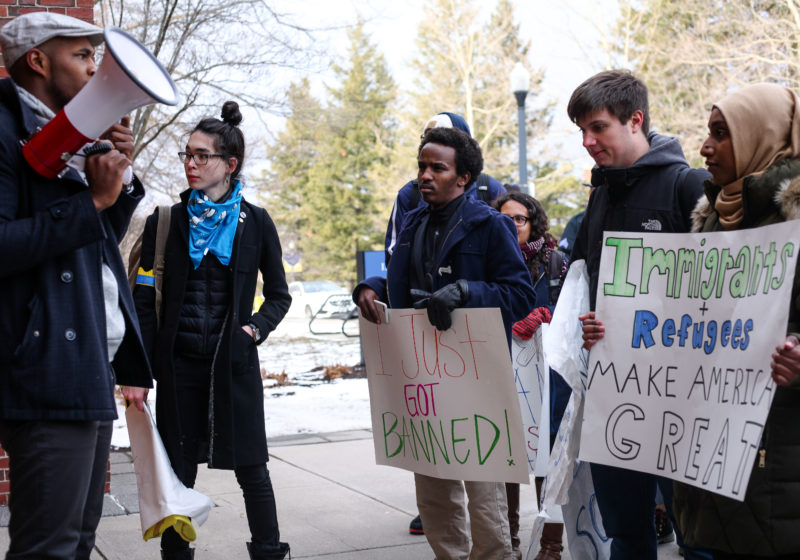Students, faculty, and Rochester locals congregated at the Interfaith Chapel last Wednesday evening for an information session regarding President Donald Trump’s recent immigration actions and their effects on UR’s international community.
The open forum was the last stop of the #NoBanNoWall demonstration, which commenced at the Wilson Commons Porch earlier that day.
Seven panelists—Director of Federal Relations Laurie Chiumento, Associate Director and Senior Immigration Advisor of the International Services Office (ISO) Kathleen Strout, Associate Director and Senior Immigration Advisor of ISO Stephanie Krause, Director and Senior Counsel of ISO Cary Jensen, Vice Provost of Global Engagement Jane Gatewood, Attorney Frank Novak, and Chief of the Department of Public Safety Mark Fischer—sat before the large audience with the hopes of clearing up any uncertainty related to the Executive Order.
In his opening remarks, Jensen—the discussion moderator—reflected on the impact of the order and emphasized the importance of gathering and sharing information.
“I’ve experienced a range of emotions, including fear, that I’m not use to feeling, quite frankly,” said Jensen.
In her speech following Jensen’s introduction, Gatewood praised UR’s diverse nature.
She said UR has welcomed international students since the mid-1850s, and that cross-border relationships have enhanced the University and expanded its global connections.
“The world of internationalized research and learning is fostered by mobility and transfer, not by bars and barriers,” said Gatewood.
In specific reference to the executive order, Gatewood announced that UR has yet to have any students, faculty, or staff turned away at international borders, but that there are a number of affiliated individuals who are on visas from the seven affected countries of Iraq, Iran, Libya, Somalia, Sudan, Syria, and Yemen.
Gatewood said that the University is still determining the impact of the order and will continue to provide updates as needed. In cases where students have unanswered questions, she said the University will work with them to find solutions.
“We are here to emphasize to everyone at the University of Rochester that you belong here,” said Gatewood. “You are part of us, we are family, and we will support you and do everything that we can in our power to protect you.”
In her concluding remarks, Gatewood also announced that University President Joel Seligman signed his name to a letter developed by the American Council on Education addressed to the Secretary of Homeland Security John F. Kelly, offering “assistance with challenges that the Department faces in connection with international students, faculty, and scholars at U.S. institutions of higher education.”
Additionally, she mentioned that UR’s Office for Global Engagement added a section to their website entitled, “Updates and Information on the Federal Immigration Executive Order,” to further assist in answering questions related to the order.
Subsequently, Dean of College Admission and Vice-Provost for Enrollment Initiatives Jonathan Burdick said that any student who finds themselves unable to return home for fear of not being able to re-enter the country will find a “meaningful opportunity” and be allowed to stay in Rochester over the summer.
After select panelists spoke, the floor was opened up to questions from the audience.
Those who felt uncomfortable speaking out were allowed to write their questions on an index card and have Director of International Student Engagement and Associate Director of Advising Services Molly Jolliff read them aloud.
The first to address the panelists was a UR graduate student, who was unsatisfied with how the University addressed the order.
“If we are addressing racism then it’s racism, if we are addressing sexism, then it’s sexism and if we are addressing Islamophobia, then we should address it as Islamophobia,” she said. “I’m honestly very frustrated with how the school is portraying this as an international issue and not as a Muslim ban.”
Senior Antonio Cardenas asked if the University has declared itself a sanctuary campus and if it will in the future.
“Given the current climate in the US, raising your hand as a sanctuary campus makes you a target,” responded Gatewood. “I know that this is upsetting from a political standpoint to some people, but know that it comes from a place where we are trying to maneuver in protective ways.”
Sophomore Haydi Torres-Garcia, an undocumented student on campus, urged other affected students to know their rights.
“I’ve been in a situation where I’ve been asked about my immigration status, and I’m telling you that immigration officers are not very nice,” said Torres.
The ISO and Legal Aid Society will be hosting a “Know Your Rights” session for students on Monday, Feb. 13 at 12 p.m. in Dewey 1-1101.






